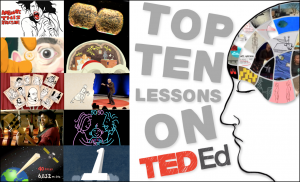
IP address correction
Our process at TED-Ed involves several steps to make sure the content we present is factually accurate. First, the authors of lessons are educators and subject matter experts. Second, we have a team of fact-checkers who review our content and flag anything that needs review. Unfortunately, there are times when we still make mistakes! That was the case with a lesson we recently published (“How do computers find websites so quickly”).
Our community was extremely helpful and proactive in identifying an error, and after further research and verification, we took the video down. We see mistakes as great learning moments, and the author of the lesson, Chand John, was kind enough to explain what went wrong. (Read his letter below.) The main content of this lesson — explaining how hash tables work and why they’re important — is something we see as valuable in and out of the classroom, and Chand is an excellent educator and communicator. So we’ll be working with him to create a new version that will come at the content from a different direction. Every video we produce takes several months to make, because our script-writing and animation-creating processes both require a lot of time and attention; please stay tuned for a new, corrected version of this video later in the year!
Below, read Chand John’s letter:
When you use the Internet, many different processes and entities are involved: domain name servers, routing protocols, and much more. In an attempt to create a lesson about hash tables in the context of Internet communication, I chose to base the lesson on a very widely available hash table, called the Linux routing cache. Here are a couple of nice descriptions of the routing cache:
http://linux-ip.net/html/routing-cache.html
https://www.cs.unh.edu/cnrg/people/gherrin/linux-net.html#tth_sEc8.2.3
There was a key mistake in how this was introduced in the lesson, however: the Linux routing cache, which contains IP addresses and related information, existed on many devices, but in conducting research for this piece, I misunderstood the context in which the routing cache is typically used.
We introduced the routing cache (which we called a “routing table” in the video, since it was one of multiple routing-related tables available on many computers) in the context of typical Web browsing. However, what the video describes is more like what a router itself can do during typical Internet use, if it happens to use this type of hash table, and *not* what your own computer typically does when you access the Internet (unless, perhaps, you configured it to act like a router itself).
In short, while the routing cache described in the video has *existed* on a very wide array of devices, it is not necessarily *used* on most of those devices for the purpose suggested in the original video.
While we tried *not* to make this lesson describe all aspects of Internet communication (our goal was to focus on one particular aspect of it involving a widely available hash table), the earlier parts of the video make it sound like this hash table is something your devices do every time you use the Internet, which is inaccurate. My big concern after realizing my mistake is that viewers not misunderstand how typical Internet communication works.
We instructors make mistakes sometimes, and sometimes we like to turn these into valuable lessons of their own: in subjects like computer science, where really tiny details can make a huge difference in whether something works or not, or whether a statement is correct or not, the important thing is to be open to feedback, to understand that we will make mistakes, to learn from those mistakes, and to share that knowledge. This is why computer programmers often review each other’s work, why many publications have editors, and why academic research papers go through detailed peer review.
When challenging yourself by learning and doing new things, you will make mistakes, experience failure, and feel discouraged at times. It is how you handle these moments that most influences whether you will continue to progress in your learning. So, those times of failure are your best opportunities to prove to yourself that you can keep going, and to see those moments not as barriers that stop your progress, but rather as stepping stones from which you can propel both yourself and others to new heights. It helps to know that you’re not alone: even the world’s most famous, successful people make mistakes. Chances are, they have made more mistakes than most people, because many of them took on difficult challenges that others avoided.
There’s a big difference between *striving* to be correct 100% of the time, and *expecting* oneself to be right all the time. Mistakes can have consequences, but if you’re willing to learn from them, chances are you will continue to progress in your learning. The biggest barrier I’ve seen to people’s progress is not being wrong at times; it’s the expectation that the point of learning is to be right all the time, and then avoiding new challenges due to an exaggerated fear of failure. And it’s important to support each other when we do encounter new challenges: that’s why we educators and TED-Ed do what we do, to support and encourage our viewers to take on new educational challenges in a fun and inspiring way.
Our top priority is to ensure that educators and students receive accurate information, and I do apologize to all viewers who may have been misinformed about the mechanics of typical Internet communication. I thank everyone who has contributed to the discussion on this video, as well as the amazing team — animators, narrator, editors, and the whole TED-Ed team — who have worked so hard on putting this together. It is a real privilege to continue to work with them on creating these beautifully illustrated lessons for the benefit of viewers worldwide.
— Chand




The main content of this lesson — explaining how hash tables work and why they’re important — is something we see as valuable in and out of the classroom, and Chand is an excellent educator and communicator. There’s a big difference between *striving* to be correct 100% of the time, and *expecting* oneself to be right all the time. Mistakes can have consequences, but if you’re willing to learn from them, chances are you will continue to progress in your learning.